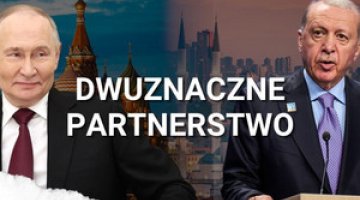Dialogue with the Eurasian Union on Ukraine – an opportunity or a trap?
The Eurasian Union (or, to give it its full name, the Eurasian Economic Union, EEU) is Russia's flagship project, by use of which it aims to institutionally subordinate the post-Soviet states to itself using political ties and the projected common economic space. The Kremlin has so far managed to persuade Belarus and Kazakhstan, and tentatively also Armenia, to join this integration project, which on the surface looks like a multilateral initiative but in reality conceals a network of bilateral relations centred on Russia. However, in order for Russia to reconstruct its influence in its neighbourhood permanently and without change, it is of key importance that Ukraine is incorporated into the EEU. That still seemed feasible even in 2013, but the Maidan and the Russian-Ukrainian war have undone this possibility. However, they also opened up an alternative scenario for Russia, one in which the Western states recognise the Eurasian Union as a legitimate partner in discussions about a new order in Europe with a view to restoring peace in Ukraine. It is worth taking into account the strategic consequences of that scenario. We need to consider if the idea which Moscow has been lobbying for – and which has found some supporters in Brussels and Berlin – threatens to take us back to the Cold War system of geopolitical blocs and implies recognition of Russia's dominance over Ukraine and the other Eastern Partnership countries?
Russia's plan to progressively vassalise Ukraine by making President Viktor Yanukovych gradually more dependent on Russian loans, by fostering autocratic tendencies in Ukraine and by putting pressure on the Ukrainian leadership to opt for the Russian integration project instead of association with the European Union broke down as a result of the revolution in the Kiev Maidan. Russia's response to the Ukrainian revolution, i.e. the annexation of Crimea and the orchestration of the armed conflict in Donbass offered Moscow a false sense of triumph, but will make it even more difficult for Russia's strategic objective to be attained. The pro-democratic, anti-corruption and pro-European expectations that the Maidan had awoken in Ukrainians were joined by a rise in anti-Kremlin, and sometimes openly anti-Russian sentiments. In September 2014, only 17% of Ukrainians were in favour of Ukraine joining the Eurasian Union, while 59% supported European integration (only two years earlier, in August 2012, supporters of Eurasian integration had the edge over those backing the EU, with figures of, respectively, 43% and 32%).[1] Irrespective of how the Russian-Ukrainian armed conflict develops and how the political situation changes in Ukraine, integration with Russia will remain a politically discredited idea in Ukraine for the foreseeable future, as was the case with Russian-Georgian relations after the war in 2008. In the case of Ukraine, this tendency will be strengthened by the exclusion of pro-Russian populations of Crimea and Donbass from the Ukrainian political space.
The fact that Russia's efforts to attract Ukraine to the Eurasian Union ended in failure does not mean that the project will no longer serve as an instrument in Russia's policy towards Ukraine in its attempt to derail Ukraine’s European aspirations and ultimately re-position it firmly in the Russian sphere of influence. It is no accident that the Russian leaders have been trying in recent weeks to persuade the Western states to develop a mechanism for constant dialogue between the EU and the EEU, with a view to contributing to a de-escalation of tension in the region. Given the inefficacy of other peace formats, the initiative has had a welcome reception from some European politicians, including the German Minister for Foreign Affairs Frank-Walter Steinmeier.[2] Some opinion-making communities have also expressed the view that dialogue between the two institutions, when supported by a strong economic component, could be a way to de-escalate the tension over Ukraine while also being a first step towards building the foundations of a new European order.[3]
In reality, however, the prospects of any constructive dialogue about European economic integration between the EU and the EEU are currently non-existent. The European conflict triggered by Russia is strictly political in nature, and the alleged contradictions of economic interests are a mere excuse. Russia has stood up against the free trade zone between the EU and the Eastern Partnership countries not because it feared a worsening of its own terms of foreign trade, but because it was concerned about the long-term geopolitical consequences of the possible modernisation of the participating states. Similarly, the main problem does not currently concern the trade sanctions imposed by Russia on Ukraine or those by the EU and Russia on each other, but the Russian tanks in Crimea and Donbass. In such circumstances, the proposal of economic dialogue between the EU and the EEU is a veiled invitation to seek a political compromise with Russia in a new format. And it is an invitation that is psychologically understandable, given the abysmal failure attempts made so far to normalise the situation; it is, however, also, politically naïve.
When analysing what use a change to the format of negotiations can be, it is necessary to depart from the assumption that Russia is not presently interested in a compromise that would allow the Ukrainian leadership to stabilise the situation in the country and start the long overdue reforms. What it is interested in is transforming Ukraine into a permanently unstable and inefficient state that will serve as a warning for the region (and also the public in Russia) about where pro-European dreams end up in the post-Soviet area. This means that Russia will be prepared to make concessions and de-escalate the conflict only if continuing the current policy turns out to be too costly in relation to the gains it generates. It is therefore in the West's interest to increase the price that Putin in paying for escalating the war, instead of meeting his expectations if there are no guarantees of reciprocity. This is especially the case since concessions and a willingness to compromise are regarded as signs of weakness in the Russian political culture and only encourage more offensive action.
Accepting Russia's proposal to recognise the Eurasian Union as a partner to the EU would appear to be a symmetric step while in fact it would not be. Unlike the democratic and (excessively) pluralistic European Union, which is the collective voice of a larger part of the continent, the EEU would be a mouthpiece of the regional hegemon whose aim is to force its neighbours into an integration project.
Transforming the format of negotiations by including the EEU would have no impact on the actual decision-making process on the Russian side. As a structure controlled by Russia, the EEU would fully represent the Kremlin's position in any negotiations, especially since the talks would concern subjects that are of fundamental importance for Russia, but not for Kazakhstan or even Belarus. There are no reasons to believe that Mr Putin or Mr Lavrov would be more inclined to make concessions if they were speaking “on behalf of the EEU”. Conversely, if the Russian side becomes more willing to reach a compromise, the parties at the negotiation table will be able to work out such a compromise irrespective of the actual format the negotiations take.
Speaking on behalf of an international organisation, it would be easier for Russian diplomacy to reject the West's demands – it would position itself as a reviewer and arbiter of an internal conflict in Ukraine, and not as a party to the conflict, obliged to make and deliver on commitments. It was Russia, not the Eurasian Union, that annexed Crimea and started the war in Donbass by sending troops and arms and shelling Ukraine's border areas from its own territory. Therefore, restoring peace will require a change in the policy of Russia, not of the Eurasian Union which is a façade entity anyway when it comes to foreign policy competences.
Furthermore, bringing the EEU to the negotiating table would offer Russia a convenient argument to force Belarus and Kazakhstan to align their positions with that of Russia. The ability of those states to distance themselves from Russia is limited already, but it is beneficial from the point of view of the West that they still retain some margin of autonomy in matters concerning Ukraine – it was because of this margin that Minsk could serve as a compromise location for the ceasefire negotiations in September 2014.
It is likely that any peace process implemented in the EU-EEU format would gradually reduce Ukraine's role from an active member of talks to a mere subject of discussion. Russia, which already has a military advantage over Ukraine, greater economic potential and a stronger international position, would be additionally strengthened in the institutional dimension as a representative of the region. In the new format Ukraine would find itself under more pressure and it would be forced to accept solutions agreed by two organisations which it does not participate in. While a scenario of this kind could speed up the normalisation of the situation in eastern Ukraine in the short term, it would entail enormous adverse consequences for the country's internal stability and geopolitical consequences for the EU. This is because Russia would not limit itself to establishing a kind of “condominium” of the two integration structures, but would use the disproportion in determination and the resources committed in order to quickly reduce any agreement reached over the heads of the Ukrainians to a strategic abdication made by the European Union in the East, since the EEU has been conceived as an alternative to the EU, and not as a complementary structure.
The very recognition of the Eurasian Union as a party to the talks by the Western states would set a precedent with significant consequences for European security. Conducting talks with Russia in the format of two competing integration blocs would be conducive to a new division of Europe. It would make it easier for Russian diplomacy to move away from discussions about the international order in Europe and towards negotiations about where to draw the line which splits Europe into two parts. Russia would claim not only to represent the EEU member states, which it cannot practically be prevented from doing, but also to be the spokesperson for the interests of a more broadly understood region. The Russian side has been unsuccessfully lobbying for an arrangement of this kind in previous years, as it advocated an institutionalisation of NATO's dialogue with the Collective Security Treaty Organisation, the Russia-led military alliance.
If Russia managed to impose a discourse centred on the rivalry between geopolitical blocs, that would be a prelude to the Western states recognising the post-Soviet area as a Russian sphere of influence not only de facto, but also formally. The Russian side would take advantage of the dialogue between the EU and the EEU as a way to impose durable institutional solutions. It should be expected that a modified proposal for the European Security Treaty would re-emerge of the type the then president Dmitry Medvedev lobbied for in 2008-2010 (and which was rightly rejected by the West). That initiative was based on an apparently harmless principle of “the indivisibility of security”, which prohibited any actions that could be perceived by the other side as undermining its security, and threatened to de facto incapacitate the West's policy in the post-Soviet area.[4] An additional advantage Russia would gain from the implementation of the above scenario would concern a further marginalisation of American influence (including that of NATO) on the emerging new European security architecture.
If the EU today agrees to enter inter-bloc consultations on Ukraine, tomorrow it will face Russia's attempts to impose a similar format for all issues in the EU's policy towards the Eastern Partnership that it deems important. The Kremlin's reaction to the gesture of good will on the part of the EU, i.e. the postponement of provisional application of the association agreement with Ukraine to 2016, may serve as an example of the Kremlin's progressing geopolitical offensive. Russia did not reciprocate the gesture with any constructive response, instead the EU's decision immediately provoked further demands for a legal and formal restatement of the commitment and for it to be extended to Moldova. Interestingly, the unilateral concessions had presumably been worked out in August 2014 in Minsk during a meeting of the leaders of the EU, Ukraine and the three EEU member states, i.e. in a format that was close to what Russia is now advocating.
Of course we do not know to what extent the West will be willing to accommodate Russia's demands. However, one should be aware of the pattern in which ill-considered concessions contribute to a further escalation of demands and lead to more tension as a result. This is the risk involved in allowing Russia to take part in the negotiations on behalf of the Eurasian Union.
Over the course of this year Ukrainians have paid a high price for their European aspirations and their objection to being incorporated into the Eurasian Union, first in the Maidan, and then in Donbass. Will they finally have to give in after the West quietly accepts a division of Europe into spheres of influence, disguised as debate on the new European order? The policy of containing Russia is costly, and the West's ability to extract concessions from the Russian leadership at this stage is still limited. However, in this war, which is also a war of nerves, strategic patience is necessary. The fact that the set of effective solutions is limited cannot serve as an argument in favour of solutions which are clearly detrimental.
[1] Cf. the surveys by the International Republican Institute: http://www.iri.org/sites/default/files/2014%20October%2014%20Survey%20of%20Residents%20of%20Ukraine%2C%20September%2012-25%2C%202014.pdf
[2] Steinmeier: Europäische Friedensordnungsteht auf dem Spiel, Die Welt, 16.11.2014.
[3] Cf. I. Krastev, M. Leonard, The New European Disorder, ECFR.
[4] For more information, see: M. Menkiszak, Greater Europe. Putin's Vision of the European (Dis)integration, OSW Studies, October 2013.





